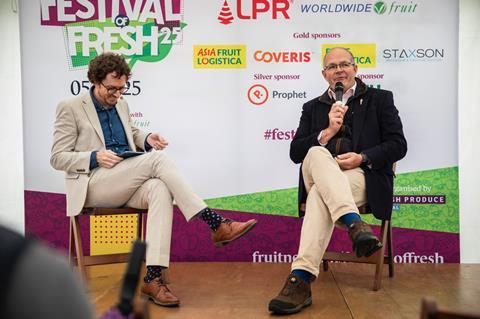In a wide-ranging interview on stage at Festival of Fresh, Tom Bradshaw covered trade deals, PO funding, energy costs and how food and farming policies will affect fresh produce

The new EU-UK reset deal will not be implemented until 1 January 2027 at the earliest, according to NFU president Tom Bradshaw, who said the union welcomed any reduction in trade friction.
Speaking at last week’s Festival of Fresh during a one-on-one interview with former FPJ editor Michael Barker, Bradshaw covered issues ranging from the rise in National Insurance costs, the proposed Employer Pays Principle, the impact of new trade deals, and targets for boosting production of fruit and veg.
Regarding the recently announced EU-UK deal, he said: “I’m being categorically told by senior officials that the 1 January 2027 is the earliest the EU deal will be implemented. I wouldn’t expect there to be any dramatic changes immediately.
“Reducing any friction has to be in everyone’s interest,” he said, noting the reopening of the seed potato market as a key benefit to produce. The deal will also see plant health certificates and organic certifications removed as part of a major new alignment of phytosanitary standards.
‘The flip side of defence spending is food security’
In a discussion about self-sufficiency targets for fruit and veg production, Bradshaw pointed to the recent announcement that the UK will dramatically re-arm in the face of volatile geopolitics.
“If we live in a volatile enough world to re-arm, the flip side of that coin is food security,” he said. “If the government genuinely feels there is enough risk to re-arm – we need imports, let me be clear, but we also need production here.
“The narrative is incredibly worrying,” he continued. “You’ve got Germany saying that a NATO country will be attacked within four years. Then we have climate change.
“As long as we get better at capturing water, we have a wonderful climate for producing food. Look at the Dutch – how are they more competitive? One of the reasons is energy costs.
“We cannot be globally competitive with a high energy baseline cost. I think there is a role for government there.”
Public money for public goods ‘won’t provide the required funds’
Moving onto public funding and other sources of income available to the produce sector, Barker asked what the NFU is doing about the upcoming closure of the Fruit and Veg Aid Scheme, and with it the end of funding for Producer Organisations.
“At the Spending Review this week, one of our priorities is to secure that funding. We want it to apply to everyone,” he said.
“In England, we are going to have one of the least supported agricultural economies in the world. That isn’t going to change with the EU deal. We are starting to look at how we could get creative with the tax system to help businesses invest.
“I don’t see how public money for public goods is going to be where we get the money that is required for this industry.”
Bradshaw also addressed another key cost concern for the industry, the proposed Employer Pays Principle (EPP), which would see employers pay the full costs associated with recruitment and is something the government is currently exploring.
“I am really, really worried about EPP,” said Bradshaw. “The only people who can stop this is retailers. If this comes in, no one in this room can afford that cost. It will go straight up the supply chain. We need to work with retailers to push back on this.”
Relationship with government
Despite emphasising the “respectful” relationship with Defra secretary of state, Steve Reed, Bradshaw was pushed on how major decisions that have caused outcry across the agriculture industry – the expanded inheritance tax and closure of the Sustainable Farming Incentive (SFI) – were carried out without consultation.
“Because it’s tax, they didn’t have to consult. I genuinely believe they think they got it wrong but they can’t see a political way out,” said Bradshaw, referring to the inheritance tax issue.
In a question from the floor, managing director of Nationwide Produce, Tim O’Malley, said: “On something as big as SFI, surely they’d have to consult the head of the NFU?”
“They’re governing really badly,” said Bradshaw. “They went to the Treasury and said can we have more money and the Treasury said no. I don’t think they knew they were shutting the door.”
The need to differentiate lowland peat
With several upcoming government strategies due to cover aspects of fresh produce, Bradshaw said he was “bereft of confidence” in gaining a coherent approach.
“At the moment we have the upcoming Food Strategy, the Land Use Framework and the Farming Roadmap, as well as school meals. Which one of those is going to hold weight?
“My big fear for the Land Use Framework is peat. We have a lot of high value horticulture produce on peat. We need to differentiate between upland and lowland peat,” he said.
“We might think we’re doing the right thing for climate change but expose ourselves on food security.”



